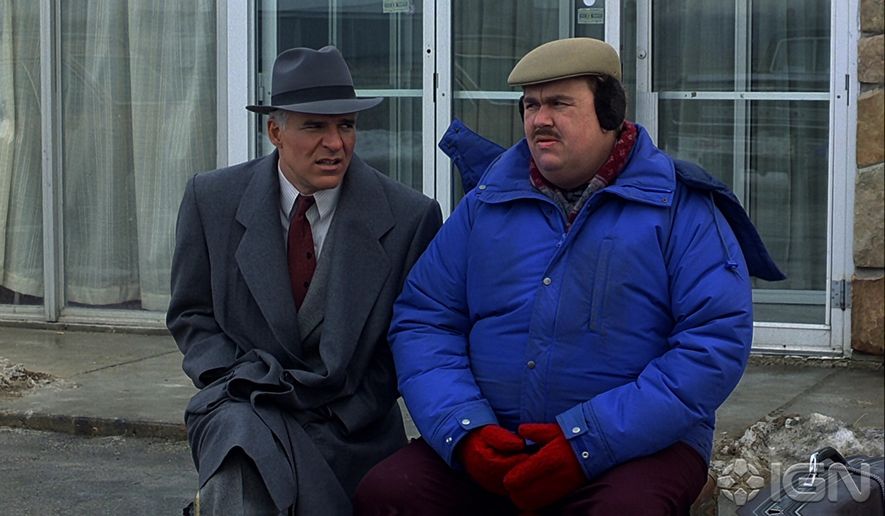Planes, Trains, and Automobiles (1987)

DIRECTOR: John Hughes
CAST: Steve Martin, John Candy
REVIEW:
Both a holiday classic (not that there’s a lot of competition for Thanksgiving movies) and one of the stronger entries in both the road trip and buddy movie genres, Planes, Trains, and Automobiles marked a bit of a change of pace for its writer-director John Hughes, moving from high school teen comedy-dramas like Sixteen Candles, The Breakfast Club, and Ferris Bueller’s Day Off to a comedy starring adults, but without abandoning his knack for mixing comedy and a little underlying sensitivity.
Neal Page (Steve Martin), an uptight advertising executive, is having a No Good, Very Bad Day (the movie could be subtitled A Series of Unfortunate Events). Neal just wants to get from his office in New York City to his family in Chicago in time for Thanksgiving—two days away—but he’s going to have to endure a movie’s worth of Murphy’s Law to get there, and to his chagrin he’s going to have to spend the vast majority of it in the unwanted company of Del Griffith (John Candy), an obnoxious shower curtain ring salesman who attaches himself to Neal like a fly on garbage. Thrown together by circumstances, the mismatched duo will find themselves using, as the title indicates, planes, trains, and automobiles on a cross-country trek to get home for the holidays.
While Planes, Trains, and Automobiles serves up laughs on a regular basis and is funnier than much of what passes for today’s comedies, Hughes shows a measure of restraint. Neal and Del get themselves into some bizarre situations, but Hughes doesn’t dumb things down with juvenile humor or take things so broad and over-the-top that it gets cartoonish. The problems they encounter are of the down-to-earth sort that viewers can empathize with. Neal’s flight from LaGuardia to O’Hara gets diverted to Wichita, Kansas. He and Del spent a night in a hotel room cramped in the same bed (leading to an awkward situation in the morning), endure incompetent and/or indifferent flight attendants and rental car clerks, suffer transportation breakdowns, have a close shave with two semis, and watch their car literally go up in flames. Meanwhile, in tried-and-true buddy movie formula, the mismatched night and day duo goes from strangers to reluctant traveling companions to slowly bonding. Hughes’ modicum of restraint extends to the characters, allowing us to see Neal and Del as real people, not cartoonish caricatures, allowing us to have a measure of investment in their odd couple bonding and their misadventures as they struggle to get home for Thanksgiving.

Steve Martin and John Candy are a perfectly cast pair. Martin gets one or two “wild and crazy guy” outbursts (and a profane tirade that pretty much singlehandedly accounts for the otherwise fairly tame movie’s R-rating and probably set some kind of record for the most F-bombs dropped in rapid succession) but overall he’s the “straight man”, playing Neal as a normal guy enduring Murphy’s Law. No one would mistake Martin for a top-flight dramatic thespian, but he gets across the most important basics that despite his occasional unpleasantness, Neal isn’t an inherently “mean” person, he’s just frustrated and at his wit’s end. John Candy plays the buffoonish, obnoxious Del, a well-meaning talkative boob who doesn’t know when to shut up, but while Candy is funny and sometimes hilarious (watch the escalating comedy of errors that stems from Del having a mishap while trying to take off his parka while driving), the role has a little more depth than one might have expected, and in fact is one of the two most dimensional characters on Candy’s filmography (the other being his surprisingly subdued performance in Only The Lonely). Take the key scene where Neal goes off on a cruel tantrum about all Del’s annoying habits, and we see the hurt slowly building in Del’s eyes. There’s a poignant revelation about Del that’s not explicitly revealed until the 11th hour, but hints are sprinkled throughout and observant viewers will probably figure it out before then. The chemistry between Martin and Candy is just about ideal for this kind of movie, a perfect fusion of “odd couple” oil and water. This is basically a two-man show, but cameos and bit parts abound, including Michael McKean, Ben Stein, Kevin Bacon (who engages in a race for a taxi with Martin early on), Edie McClurg (the recipient of Martin’s avalanche of F-bombs), Bill Erwin, William Windom, Charles Tyner, Larry Hankin, Laila Robins (as Neal’s wife), Martin Ferrero (who’d become best-known as the unfortunate lawyer Gennaro in Jurassic Park six years later), and Dylan Baker. Baker gets the best part, a walk-on bit that is laugh out loud hilarious. Apart from Martin and Candy though, no one else is onscreen for more than a few minutes (at most); one could almost envision this being adapted into a two-man play.
Planes, Trains, and Automobiles shows a rare deftness of touch in mixing consistently amusing and sometimes hilarious comedy with light drama. It wasn’t the only film on John Hughes’ filmography to show his knack for the above—in fact, that quality was something of a Hughes trademark—but it succeeds smoothly enough to elevate this to among the stronger entries on Hughes’ filmography. While there’s nothing tremendously deep or complex here—nor is it trying to be—there’s moments that can both make us laugh and pluck at the heartstrings, and generates enough goodwill that it goes down easily and smoothly and allows us to readily overlook its occasional mawkishness. It sends us on our way with both laughter and good feeling, which is really all we can ask from a holiday comedy-drama. Neal Page and Del Griffith might face a twisty-turny misadventure, but we might find, as they do, that it’s a journey worth taking.
* * *